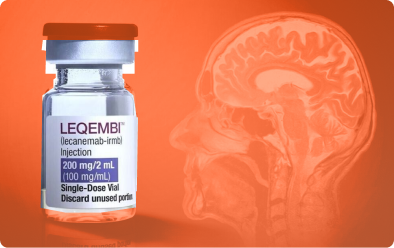

In a significant milestone for Alzheimer's disease treatment, the U.S. Food and Drug Administration (FDA) recently approved the groundbreaking new drug, Leqembi. The medication is poised to bring new hope and treatment options to the more than 55 million people worldwide currently diagnosed with dementia or Alzheimer’s. To better understand Leqembi’s potential impacts, let’s unpack six common questions from Alzheimer’s caregivers and patients.
1. What is Leqembi and how does it work?
Leqembi, also known as lecanemab, is a disease-modifying drug that works by targeting the build-up of amyloid-beta plaques in the brain, a hallmark of Alzheimer’s disease.
2. Why is targeting amyloid-beta protein in the brain so important?
When this protein accumulates in the brain, it leads to the formation of plaques that disrupt communication between brain cells and contribute to cognitive decline.
Leqembi binds to and eliminates amyloid-beta, reducing its accumulation and potentially slowing down Alzheimer’s progression.
3. How is Leqembi administered and how much does It cost?
Leqembi is administered as an intravenous infusion every two weeks. This process takes about an hour. When the drug received full FDA approval, CMS said it would be covered under Medicare Part B (for outpatient medications). Some patients may still have an annual copay of more than $5,000.
4. Who is Leqembi made for?
Developed for patients in the early stages of Alzheimer's disease, Leqembi specifically targets mild cognitive impairment or mild dementia. Clinical trials have focused on this population, showcasing the drug's potential efficacy in slowing the disease.
5. How will Leqembi impact cognitive care?
While Leqembi represents a significant advancement in Alzheimer's treatment, it’s not a cure. But, when used in partnership with routine testing and early detection strategies, Leqembi creates a fighting chance for patients to retain cognitive abilities and extend their quality of life for longer periods of time.
6. When does Leqembi work best?
Early detection and intervention are key to Leqembi’s success. Primary care teams play a pivotal role in screening and assessing early signs of cognitive impairment. By detecting the disease in its early stages, patients gain timely access to treatments like Leqembi.
Putting Leqembi to work for Alzheimer’s patients
Leqembi's FDA approval marks a significant step forward in Alzheimer's disease treatment. By combining Leqembi with routine testing and early intervention, patients with mild cognitive impairment or dementia have a better chance of retaining their cherished memories and maintaining their cognitive abilities for longer periods.
As research and clinical experience with Leqembi continue to expand, the hope for better Alzheimer's treatments and eventual cures grows stronger. Continuing to find ways to identify cognitive issues early is key—and Neurotrack’s 3-Minute Cognitive Screening can play a pivotal role in the effort to detect impairment at scale.




